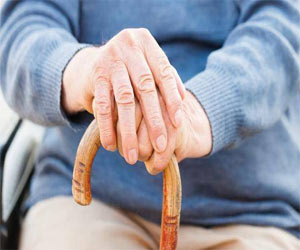- Home
- Editorial
- News
- Practice Guidelines
- Anesthesiology Guidelines
- Cancer Guidelines
- Cardiac Sciences Guidelines
- Critical Care Guidelines
- Dentistry Guidelines
- Dermatology Guidelines
- Diabetes and Endo Guidelines
- Diagnostics Guidelines
- ENT Guidelines
- Featured Practice Guidelines
- Gastroenterology Guidelines
- Geriatrics Guidelines
- Medicine Guidelines
- Nephrology Guidelines
- Neurosciences Guidelines
- Obs and Gynae Guidelines
- Ophthalmology Guidelines
- Orthopaedics Guidelines
- Paediatrics Guidelines
- Psychiatry Guidelines
- Pulmonology Guidelines
- Radiology Guidelines
- Surgery Guidelines
- Urology Guidelines
Frail patients at increased risk of delirium and cognitive decline after cardiac surgery

Delhi: Patients with frailty are at a higher risk of developing delirium after cardiac surgery as compared to patients without frailty. Also, frail patients are at increased risk for cognitive decline after 30 days of the surgery. These differences, however, diminish one year after the surgery.
These are the results of a study presented at the annual meeting of the American Society of Anesthesiologists.
Since preserving patients’ cognitive abilities is an important goal after surgery, understanding the potential contribution of frailty to postoperative delirium and longer-term cognitive decline is important for risk stratification and optimization of perioperative management.
Andrew Laflam, a medical student at Tufts University School of Medicine in Boston, and colleagues hypothesised was that frailty would be associated with an increased risk of delirium during hospitalization (primary hypothesis). And, that frailty would be associated with a decline in composite cognition one month and 12 months postoperatively (secondary hypothesis).
“Postoperative delirium is common in the cardiac surgery population, with an estimated incidence of up to 50%,” said Laflam. “Frailty is associated with poor outcomes, even in nonsurgical populations, and is also common in cardiac surgery patients.”
The study used data from two trials that assessed frailty at baseline using the Fried Frailty Index, a validated scoring method composed of five age-related domains: shrinking, weakness, exhaustion, low physical activity and slow walking speed.
Delirium was assessed by various means, including the Confusion Assessment Method (CAM) and CAM-ICU. Neuropsychological testing was generally performed within two weeks of surgery, as well as four to six weeks and one year after surgery. Chart reviews were done on days when patients were not assessed in person.
The final cohort involved 133 patients.
Also Read: Frailty: New screening tool for assessing fitness for operation
Key findings of the study include:
- Pre-frail and frail patients were more likely to have congestive heart failure, higher logistic EuroSCORE (European System for Cardiac Operative Risk Evaluation) and surgical valve repair than their non-frail counterparts.
- An overall incidence of delirium was found to be 42%.
- The incidence was 48% in both the pre-frail and frail populations, compared with 13% among non-frail patients.
- Univariate and multivariate models showed the odds of delirium were significantly higher for pre-frail patients (adjusted odds ratio [OR], 6.43) and frail patients (adjusted OR, 6.31) than for non-frail patients.
- The decline in composite cognitive z score was greater from baseline to 30 days in frail patients than in non-frail patients in both univariate and multivariate models.
- By one year after surgery there were no differences in the association of baseline frailty with the change in cognition.
Also Read: Diabetes increases risk of fractures in those who are frail, finds study
Nevertheless, the trial helped illustrate that compared with non-frail patients, both pre-frail and frail patients were at high risk for delirium after cardiac surgery. “Additionally, frail patients were at higher risk for our secondary outcome of greater decline in cognitive function at one month, but we did not see it at one year following surgery.
“Frailty seems to be a risk factor for delirium in cardiac surgery patients,” Laflam added, “but more research is needed to identify targeted strategies in order to improve outcomes in these patients.”

Disclaimer: This site is primarily intended for healthcare professionals. Any content/information on this website does not replace the advice of medical and/or health professionals and should not be construed as medical/diagnostic advice/endorsement or prescription. Use of this site is subject to our terms of use, privacy policy, advertisement policy. © 2020 Minerva Medical Treatment Pvt Ltd